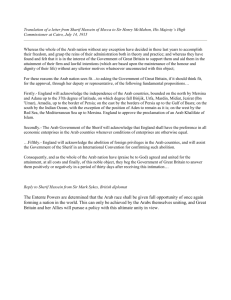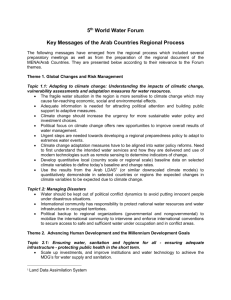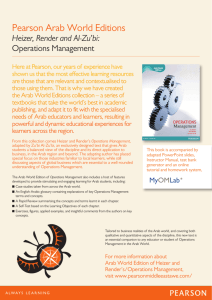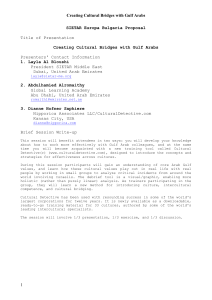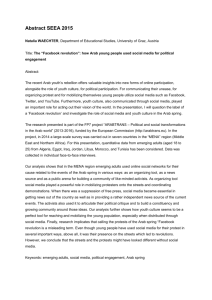Please see the syllabus for more information
advertisement
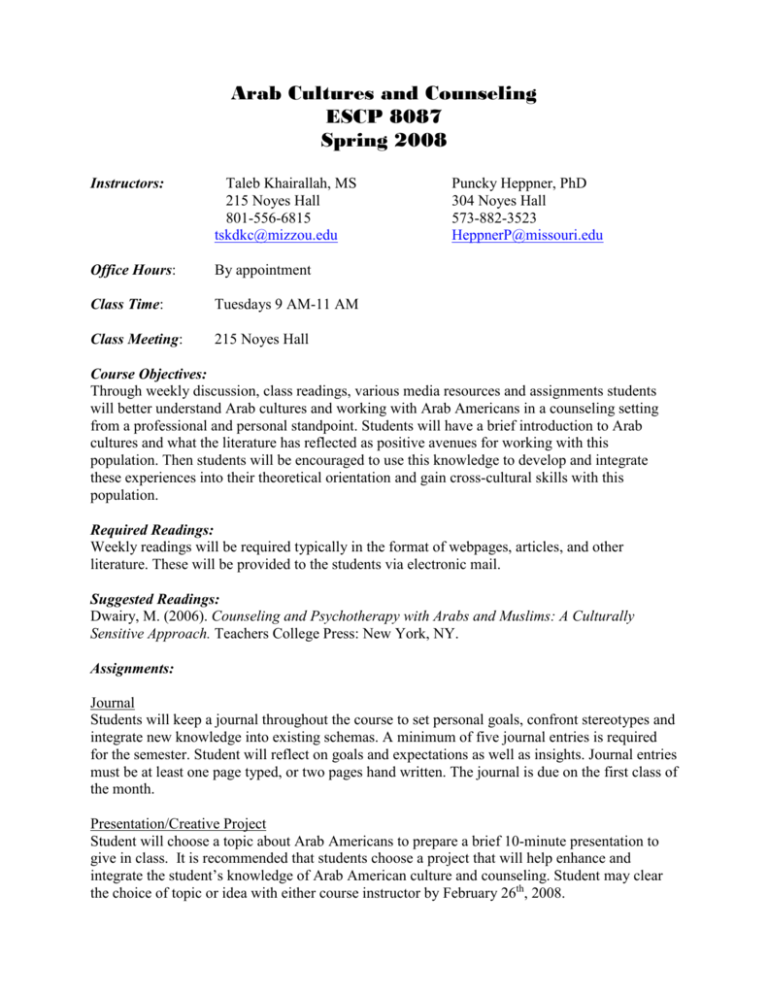
Arab Cultures and Counseling ESCP 8087 Spring 2008 Instructors: Taleb Khairallah, MS 215 Noyes Hall 801-556-6815 tskdkc@mizzou.edu Office Hours: By appointment Class Time: Tuesdays 9 AM-11 AM Class Meeting: 215 Noyes Hall Puncky Heppner, PhD 304 Noyes Hall 573-882-3523 HeppnerP@missouri.edu Course Objectives: Through weekly discussion, class readings, various media resources and assignments students will better understand Arab cultures and working with Arab Americans in a counseling setting from a professional and personal standpoint. Students will have a brief introduction to Arab cultures and what the literature has reflected as positive avenues for working with this population. Then students will be encouraged to use this knowledge to develop and integrate these experiences into their theoretical orientation and gain cross-cultural skills with this population. Required Readings: Weekly readings will be required typically in the format of webpages, articles, and other literature. These will be provided to the students via electronic mail. Suggested Readings: Dwairy, M. (2006). Counseling and Psychotherapy with Arabs and Muslims: A Culturally Sensitive Approach. Teachers College Press: New York, NY. Assignments: Journal Students will keep a journal throughout the course to set personal goals, confront stereotypes and integrate new knowledge into existing schemas. A minimum of five journal entries is required for the semester. Student will reflect on goals and expectations as well as insights. Journal entries must be at least one page typed, or two pages hand written. The journal is due on the first class of the month. Presentation/Creative Project Student will choose a topic about Arab Americans to prepare a brief 10-minute presentation to give in class. It is recommended that students choose a project that will help enhance and integrate the student’s knowledge of Arab American culture and counseling. Student may clear the choice of topic or idea with either course instructor by February 26th, 2008. Arab Cultures & Counseling Syllabus, 2 Evaluation: Evaluation will be based on active participation in class meetings, completion of class assignments, leadership of assigned class discussions or presentations, and demonstration of skills. If you are unable to attend a particular class, please let the instructors know by phone or e-mail. The total points possible for the course are 300. Major Projects: Journal (5 entries/20 points each) 100 Creative Project or Presentation 50 Class Participation 150 Grades A=270-300 points (90-100% of total points) B=240-269 points (80-89% of total points) C=210-239 points (70-79% of total points) D=180-209 points (60-69% of total points) F=below 179 points Additional Optional Experience: An optional experience for a hands-on experience with an Arab culture can be determined by class desire and consensus. Through this brief immersion experience we would be able to gain valuable insight that cannot be conveyed in the classroom. Some suggestions for obtaining this immersion experience could be a trip to a local mosque or Arab community center. Tentative Course Schedule: This course schedule will change according to the needs of the students as well as the availability of class speakers. Updated course schedules will be distributed during the semester. Week 1: 1/22 Introduction Syllabus review Current definitions of Arabs Class expectations Initial journal entry Week 2: 1/29 History of the region- Antiquity City states, empires, and dynasties. Trade and wars Week 3: 2/5 History of the region- continued Migration to US League of Arab writers Evolving geographical definitions Case study of Arab American experience Week 4: 2/12 History of the region- Rise of Islam, Impact of WWI & WWII, Arab nationalism Arab Israeli conflict Inter-faith relations Arab Cultures & Counseling Syllabus, 3 Week 5: 2/19 Guest speaker: Dr. Shakir Hamoodi Arab American experience Social justice and activism Week 6: 2/26 Arab countries Class presentations Week 7: 3/4 Arab countries (Continued) Arab cultures Video: “Little Mosque on the Prairie” and discussion Week 8: No Class/ presentation preparation time Week 9: 3/18 Islam Visit to Islamic Center of Central Missouri- Mosque Guest Speaker: Hend El-Buri- Muslim Speaker’s Bureau of Columbia Week 10: 3/25 Spring Break No Class Week 11: 4/1 Arab Americans: Who are they? Census data Migration patterns Muslim Americans Arab American contributions to US Week 12: 4/8 Arab Americans in Film View “Reel Bad Arabs” and discussion Stereotypes Week 13: 4/15 Guest lecture: Rihab Sawah Religious tolerance and inter-religion processes Gender roles Week 15: 4/22 Mental health Factors impacting counseling Holistic care Integration of traditional healing Cultural tailoring Week 16: 4/29 Individual Class Presentations Week 17: 5/6 Class evaluations Potluck feast Arab Cultures & Counseling Syllabus, 4 Academic Honesty Statement Academic honesty is fundamental to the activities and principles of a university. All members of the academic community must be confident that each person’s work has been responsibly and honorably acquired, developed, and presented. Any effort to gain an advantage not given to all students is dishonest whether or not the effort is successful. The academic community regards academic dishonesty as an extremely serious matter, with serious consequences that range from probation to expulsion. When in doubt about plagiarism, paraphrasing, quoting or collaboration consult a course instructor. As required by the Provost’s office, the university policy on academic dishonesty is included here as follows: “It is the duty of any instructor who is aware of an incident of academic dishonesty in his/her course to report the incident to the Vice Provost, 116 Jesse Hall, and to inform the department chair of the incident.” ADA Statement/ Need for Accommodations It is important that persons with special needs [as addressed by the Americans with Disabilities ACT (ADA)] are fully included in this course, and reasonable efforts will be made to accommodate your needs. Please let me know in advance if you need any special accommodations in curriculum, instruction, or assignments for the course to enable you to fully participate. I will try to maintain the confidentiality of the information you share with me. If you have emergency medical information to share with me, or if you need special arrangements in case the building must be evacuated, please inform me immediately. We can meet privately after class, or at my office. To request academic accommodations (for example, a note taker), students must also register with Disability Services, S5 Memorial Union, 882-4696. It is the campus office responsible for reviewing documentation provided by students requesting academic accommodations, and for accommodations planning in cooperation with students and instructors, as needed and consistent and consistent with course requirements. Another resource, MU’s Adaptive Computing Technology Center, 884-2828, is available to provide computing assistance to students with disabilities. For other MU resources for students with disabilities, click on “Disability Resources” on the MU Homepage. For more information about the rights of people with disabilities, please see ada.missouri.edu or call 884-7278.



